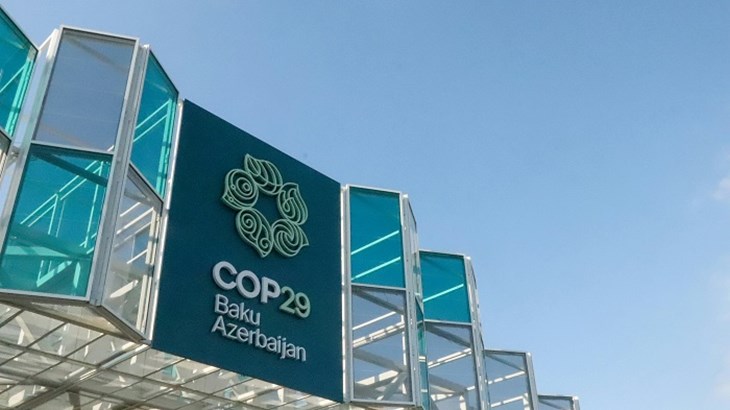Championing food systems transformation at COP29
Published 26/11/2024

The 2024 United Nations (UN) Conference of the Parties of the UNFCCC, known as COP29, has drawn to a close, after ten days of negotiations, events and discussions to tackle the global climate crisis.
For members of our International Affairs team who were on the ground at the Azerbaijan event, it was the end of a busy two weeks hosting and speaking at events, following discussions, and engaging with governments and other stakeholders on the importance of food systems, and animal agriculture in climate mitigation.
Collaborative solutions needed
On 20th November – together with the Government of Pakistan, UNEP, INMS and other partners – we hosted an event, Sustainable nitrogen management: Collaborative solutions for climate action, environment and food security.
Held at the Pakistan pavilion, the event explored the urgent need to optimise nitrogen use in agriculture in order to tackle climate change and reduce and reverse environmental damage, while ensuring food security.
Our Global Head of International Affairs Eirini Pitsilidi joined speakers from the Governments of Pakistan, Japan and Romania, as well as Bruno Pozzi, Deputy Director of the Ecosystems Division, UNEP, Professor Mark Sutton, Director INMS/SANH and Co-Chair of UNEP-GPNM and Tariq Aziz, Regional Director for South Asia INI, Associate Professor, UAF.
During her presentation, she explained that: “We need both immediate, tangible changes to achieve more efficient nitrogen use and nutrient recovery as well as longer-term, transformational changes that include both the obvious and the less obvious - including, for instance, indirect changes such as behavioural shifts related to our diets, especially in populations where we know we overconsume animals sourced foods"
She finished by stressing the need for ‘collaborative solutions’, and called on governments, academics, the private sector, farmers, and other stakeholders to participate in the dialogue.
The session concluded a series of events throughout the year in which we raised awareness of the importance of sustainable nitrogen management at the highest level.
A crucial platform for effecting real change
The UN’s global climate change conference provides an opportunity for leaders to gather annually and make commitments to tackle climate change.
There is a growing understanding of the role that food systems – and more specifically, overconsumption of meat and dairy in many high-income countries – plays in greenhouse gas emissions and climate change. This year at COP29, for the third consecutive year, food and agriculture are acknowledged as key issues in addressing climate change, with 19th November dedicated to Food, Water and Agriculture.
Hosting events to springboard discussion
On 16th November, together with other partners in the animal welfare and food systems space, we co-hosted a day devoted to Just Transition at the Action on Food Hub. We organised a side event with Four Paws, Climate and animal agriculture: The soil health, nature-positive farming and consumption nexus, where speakers explored how sustainable animal protein consumption patterns, coupled with a shift to traditional, nature-friendly farming practices can have the potential to improve soil health, vital in the fight against climate change.
Later that day, we co-hosted a roundtable, Creating a vision for food system transformation – how do we get there? Rune-Christoffer Dragsdahl, who contributed a chapter to our new book, Regenerative Farming and Sustainable Diets, shared his experiences from Denmark, alongside Thayana Oliveira from Brazil, collectively showing what is possible when it comes to dietary shifts and reducing overreliance on animal protein in two very different contexts.
On 18th November, we presented at an official UNFCCC side event, with partners including ProVeg International and Brighter Green, a ‘fireside chat’ titled From Field to Plate: Aligning food systems with climate and biodiversity goals. Speakers including Rachel Atcheson, Deputy Director of the NYC Mayor's Office of Food Policy and Salome Owunda, Africa Centre for Sustainable and Inclusive Development, Climate Change, Gender and Social Inclusion Practitioner explored the tangible and practical paths for global food systems transformation through policy, in order to meet climate, nature and biodiversity goals.
Raising awareness
Andrea Perez, our Global Manager of Food Systems Advocacy, said: “We are running out of time to introduce real, lasting policies that will mitigate climate change. It is vital that we address our broken global food system in order to have any chance of meeting the targets of the Paris Agreement and limiting global warming to 1.5 degrees Celsius.
“By attending COP29, we were able to raise awareness of the urgent need to introduce global and national policies to shift towards more climate-friendly farming practices, and address overconsumption of animal-sourced foods in those populations who are simply consuming far too much for our planet to sustain. We look forward to building on our connections and relationships as we look ahead to COP30 in Brazil.”
